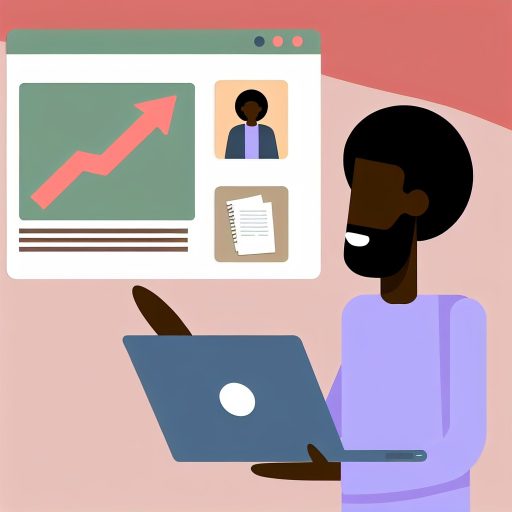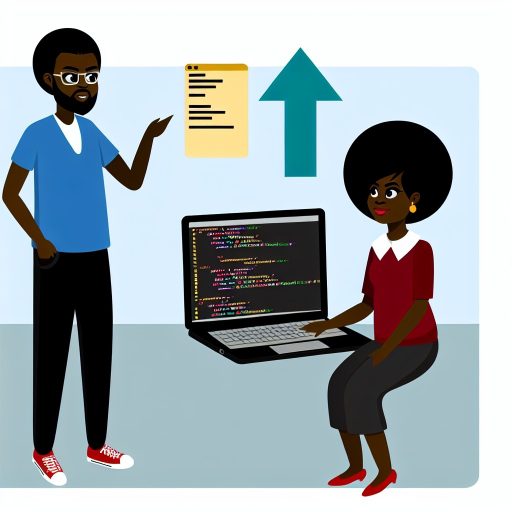Understanding the Importance of Showcasing Programming Projects During Interviews
Demonstrating Technical Skills
Presenting programming projects highlights your technical proficiency.
Interviewers seek evidence of your coding capabilities.
Showcasing your work builds credibility in your skill set.
It effectively proves you can tackle real-world challenges.
Communicating Problem-Solving Abilities
Projects illustrate your problem-solving approach.
Discussing challenges you faced enhances your narrative.
It showcases your ability to overcome obstacles efficiently.
Interviewers appreciate practical examples of your critical thinking.
Highlighting Collaboration and Team Skills
Many programming projects involve teamwork.
Demonstrating your role in collaborations is vital.
Sharing successes and learning outcomes can impress hiring managers.
Employers often value teamwork alongside technical abilities.
Building Confidence and Engagement
Presenting your work gives you a sense of pride.
Your enthusiasm for the project can engage interviewers.
A passionate presentation creates a memorable impression.
Unlock Your Unique Tech Path
Get expert tech consulting tailored just for you. Receive personalized advice and solutions within 1-3 business days.
Get StartedConfidence can set you apart from other candidates.
Networking and Relationship Building
Discussing projects fosters connections with interviewers.
It opens doors for further conversations about technology.
Sharing insights might resonate with the interviewers’ interests.
Networking can have long-term benefits for your career.
Choosing the Right Projects to Present
Understanding Relevance
Relevance is key when selecting programming projects to showcase.
Focus on projects that relate directly to the job you’re applying for.
This connection can demonstrate your fit for the role.
Identifying relevant skills helps you leave a strong impression.
Research the company to align your projects with its goals.
Highlight projects that address real-world problems the company faces.
Assessing Complexity
Complexity matters when presenting programming projects.
Showcase projects that exhibit your technical skills effectively.
Choose those that challenge you yet remain understandable.
Unlock Premium Source Code for Your Projects!
Accelerate your development with our expert-crafted, reusable source code. Perfect for e-commerce, blogs, and portfolios. Study, modify, and build like a pro. Exclusive to Nigeria Coding Academy!
Get CodeBalance complexity with clarity to engage your audience.
Avoid overly intricate projects that may confuse the interviewer.
Instead, opt for projects that highlight your growth as a developer.
Demonstrating a Range of Skills
Presents a diverse portfolio to highlight various skills.
Include front-end and back-end projects to showcase versatility.
Utilize different programming languages where appropriate.
Add examples of collaboration, such as group projects.
Communicate your role and contributions in each project clearly.
Preparing for Questions
Be ready to discuss your project choices in depth.
Prepare to explain challenges faced and solutions implemented.
Ask yourself what lessons you learned from each project.
Articulate how these experiences make you a better developer.
Practice answers to potential questions about your projects.
Structuring Your Presentation
Begin your presentation with a brief overview.
Clearly state the purpose of your projects.
Introduce your background and relevant experience.
Highlight your passion for programming and problem-solving.
Engage the interviewer’s interest early on.
Body
Organize the body into distinct sections for each project.
Describe the project goals and objectives clearly.
Explain the technologies and tools you utilized.
Share any challenges you faced and how you overcame them.
Use visuals to enhance understanding and engagement.
Incorporate code snippets or demos where appropriate.
Discuss the impact or results of your projects.
Create a smooth transition between project descriptions.
Ensure each project showcases different skills.
Link your projects to potential contributions to the company.
Wrap Up Your Presentation
Summarize the key points of your presentation effectively.
Reiterate your enthusiasm for the position and company.
Invite questions from the interviewer to encourage dialogue.
Express your gratitude for the opportunity to present.
Leave the interviewer with a positive impression of your work.
Uncover the Details: How Programming Projects Can Showcase Your Skills to Employers
Highlighting Your Role and Contributions in Team Projects
Understanding Your Role
Begin by clearly defining your role in the project.
This allows interviewers to understand your unique contributions.
For example, mention if you were the project lead or a developer.
Explain how your expertise influenced the project’s outcome.
Describing Your Contributions
Share specific tasks and responsibilities you undertook.
Quantify your contributions wherever possible for impact.
For instance, you can mention the number of features you developed.
Highlight how you solved critical problems during the project.
Using Collaborative Tools Effectively
Discuss the tools you used to collaborate with your team.
For example, platforms like GitHub or Jira can enhance teamwork.
Explain how these tools aided communication and task management.
Share any challenges encountered with these tools and how you overcame them.
Showcasing Team Achievements
Present the overall success of the team project.
Highlight metrics such as project completion time or quality improvements.
Discuss how your contributions led to achieving these results.
Incorporate positive feedback received from team members or stakeholders.
Demonstrating Leadership Skills
Illustrate any leadership skills you showcased during the project.
For example, did you mentor junior developers or lead meetings?
Discuss how you inspired your team to overcome obstacles.
Leadership experience can significantly enhance your candidacy.
Reflecting on Feedback and Adaptability
Talk about the feedback you received from team members.
Explain how you implemented constructive feedback into your work.
Being adaptable shows your willingness to grow and learn.
Highlight instances where you adjusted your strategy based on team dynamics.
Explore Further: How to Balance Learning and Doing in Programming Projects
Demonstrating Technical Skills Through Code Samples and Live Demos
Understanding the Importance of Code Samples
Code samples showcase your coding skills effectively.
They allow interviewers to assess your problem-solving abilities.
Additionally, they highlight your familiarity with programming languages.
A well-documented code sample can demonstrate your thought process.
Keep your samples relevant to the position you’re applying for.
Choosing the Right Projects to Showcase
Select projects that align with the job requirements.
Consider including personal, academic, or open-source projects.
It’s beneficial to demonstrate a variety of skills.
Projects involving collaboration can show teamwork capabilities.
Communicate the impact of your projects during the interview.
Creating an Effective Presentation
Start with a brief overview of each project.
Explain the problem you aimed to solve in the project.
Outline the technologies and tools you used.
Share challenges you faced and how you overcame them.
End with the project’s outcomes and any positive feedback received.
Preparing for Live Demos
Practice your live demo multiple times before the interview.
Ensure all necessary software and tools are installed and functioning.
Start by setting context and sharing your screen.
Walk through your code logically, highlighting key features.
Invite questions as you go, encouraging engagement from interviewers.
Tips for Engaging Interviewers
Maintain eye contact and use positive body language.
Explain your thought process clearly throughout the demo.
Use analogies to make complex concepts easier to grasp.
Be prepared to adapt based on interviewers’ reactions.
Show enthusiasm for the project and area of expertise.
Discover More: How to Build Apps That Solve Everyday Nigerian Problems
Effectively Using Visual Aids
Importance of Visual Aids
Visual aids enhance understanding and retention of information.
They make complex concepts easier to grasp.
Moreover, they engage your audience more effectively.
Using Slides
Slides should be clear and concise.
Limit text to key points and use bullet lists.
Incorporate visuals such as images and graphs.
This keeps your presentation visually appealing.
Practice navigating through your slides smoothly.
Incorporating Diagrams
Diagrams help illustrate intricate systems or processes.
Use flowcharts to depict workflows clearly.
Consider using UML diagrams for software projects.
These visuals can significantly enhance comprehension.
Ensure diagrams are labeled correctly for clarity.
Utilizing Videos
Videos can showcase your project’s functionalities effectively.
They create an immersive experience for your audience.
Make sure the video is concise and to the point.
Additionally, explain the video’s content during your presentation.
This reinforces the key messages you want to convey.
Best Practices for Visual Aids
Consistency in style across all visual aids is crucial.
Choose a cohesive color palette and font style.
Ensure all visuals are high-quality and relevant.
Test your equipment before the interview for seamless transitions.
Finally, be prepared to answer questions about your visuals.
Delve into the Subject: How Side Projects Keep Nigerian Developers Ahead of the Curve

Preparing for Common Interview Questions Related to Your Projects
Understanding the Importance of Your Projects
Your projects illustrate your skills and experience.
Employers value your hands-on work in programming.
Discussing these projects can set you apart from other candidates.
Identifying Key Questions
Research the common questions asked in interviews.
Examples include inquiries about your role, technologies used, and challenges faced.
Make a list of these questions to guide your preparation.
Structuring Your Responses
Use the STAR method to structure your answers effectively.
- Start with the Situation you encountered.
- Explain the Task at hand.
- Detail the Action you took.
- Conclude with the Result of your efforts.
Practicing Your Delivery
Practice discussing your projects with peers or mentors.
This will help build your confidence and enhance clarity.
Focus on articulating the impact and significance of your work.
Highlighting Technical Complexity
Be prepared to discuss the technical aspects of your projects.
Explain the programming languages and frameworks you used.
Additionally, identify any innovative solutions you implemented.
Demonstrating Problem-Solving Skills
Interviewers will assess your problem-solving capabilities.
Be ready to share specific challenges you faced.
Discuss the strategies you employed to overcome these obstacles.
Communicating Team Collaboration
Many projects involve teamwork, so highlighting collaboration is key.
Share examples of how you worked with others effectively.
Describe your role and contributions within the team dynamic.
Emphasizing Continuous Learning
Show your commitment to growth by discussing improvements you made.
Consider sharing how you integrated feedback to enhance your projects.
Additionally, mention any skills you developed during these experiences.
Practicing Your Presentation for Clarity and Confidence
Understanding Your Project
Start by thoroughly understanding your project details.
Explain the purpose and functionality clearly.
Identify the target audience for your project.
This will help tailor your presentation effectively.
Structuring Your Presentation
Organize your slides or notes logically.
Begin with an overview of your project.
Next, dive into the development process.
Conclude with results and future opportunities.
Practicing Your Delivery
Rehearse your presentation multiple times.
Practice in front of a mirror or record yourself.
This helps improve your body language and tone.
Seek feedback from friends or mentors.
Engaging Your Audience
Maintain eye contact with your audience.
Use gestures to emphasize key points.
Encourage questions to foster interaction.
This keeps listeners engaged and interested.
Handling Questions Confidently
Prepare for potential questions beforehand.
Listen carefully to each question asked.
Respond clearly and concisely.
If unsure, it’s okay to admit it and offer to follow up later.
Utilizing Visual Aids Effectively
Use visuals to enhance your presentation.
Ensure slides are clear and not overly cluttered.
Charts and diagrams can help explain complex concepts.
Use relevant images to support your narrative.
Requesting Feedback from Peers or Mentors Before the Interview
Importance of Receiving Feedback
Feedback plays a crucial role in enhancing your project presentation.
It provides new perspectives you may not have considered.
Additionally, it helps you identify strengths and weaknesses in your projects.
Constructive criticism enhances your confidence before the interview.
Choosing the Right People for Feedback
Select peers or mentors who understand programming concepts well.
Avoid individuals unfamiliar with your field to ensure relevance.
Choose people who can provide honest and constructive insights.
This variety will give you a comprehensive understanding of your project.
How to Request Feedback Effectively
Clearly communicate what specific aspects you want feedback on.
For example, focus on clarity, design, or functionality.
Provide a brief overview of your project for context.
Request feedback in a timely manner to give others sufficient time.
Incorporating Feedback into Your Presentation
Review and analyze the feedback you receive critically.
Implement the suggestions that resonate most with your project goals.
Make sure to practice your presentation with the new insights.
Adjust your materials to reflect the changes made based on feedback.
Following Up After Receiving Feedback
It’s essential to express gratitude to those who provided feedback.
Share the improvements you’ve made based on their suggestions.
This fosters a positive relationship for future collaboration.
Moreover, it demonstrates your commitment to personal growth.
Following Up Post-Interview
Importance of Follow-Up
Following up after an interview is crucial for reinforcing your interest.
It provides an opportunity to share any additional thoughts.
You can clarify points that may have been misunderstood during the interview.
Timing Your Follow-Up
Send your follow-up message within 24 hours after the interview.
This timing shows enthusiasm and professionalism.
However, ensure you give enough time for the interviewers to process their thoughts.
What to Include in Your Follow-Up
Start by thanking the interviewer for their time and the opportunity.
Express your continued interest in the position and the company.
Share additional resources related to your project, such as GitHub links or relevant articles.
Include clarifications on any technical questions that may have arisen during the interview.
Content Suggestions
Here are a few content suggestions for your follow-up message:
- A brief recap of your project and its significance.
- Links to relevant documentation or demos that enhance your project.
- Any additional achievements or insights that showcase your skills.
Maintaining Professionalism
Keep your tone professional and courteous in your follow-up.
Avoid being overly verbose or aggressive in your communication.
This balance ensures the interviewers view you positively and may boost your chances.
Preparing for Responses
Be ready for any responses to your follow-up message.
Some interviewers may appreciate your initiative and engage further.
Respond promptly if they reach out, and maintain a clear communication line.
Additional Resources
Nigeria education project wins USAID CLA competition – Creative




